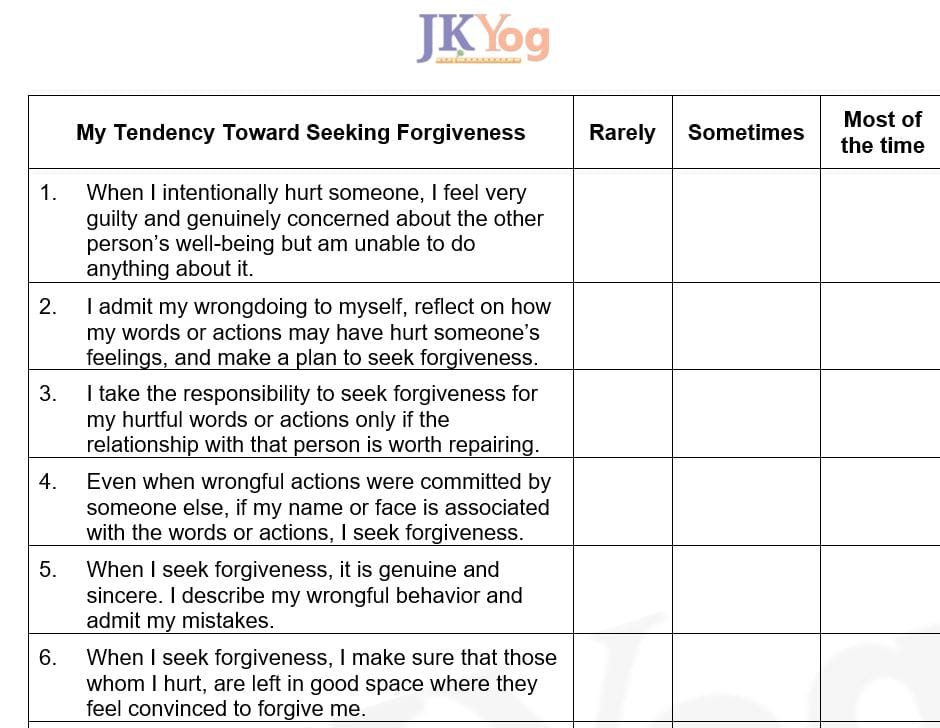In our spiritual journey, we often encounter challenges that test our capacity for forgiveness. The ability to forgive others and ourselves is a cornerstone of spiritual development, yet it remains one of the most difficult virtues to cultivate. To aid us in this essential practice, we are introducing The Forgiveness Barometer, a self-assessment tool designed to illuminate our beliefs and tendencies regarding forgiveness.
Understanding the Forgiveness Barometer
The Forgiveness Barometer is more than just a questionnaire; it is a mirror that reflects our inner landscape of forgiveness. By engaging with this tool, we gain valuable insights into our thought patterns, emotional responses, and actions related to forgiveness. This self-awareness is the first step towards positive change and spiritual growth.
As Swami Mukundananda often reminds us, "Self-awareness is the foundation of self-improvement." The Forgiveness Barometer helps us lay this foundation by bringing to light our often unconscious beliefs and habits surrounding forgiveness.

The Structure of the Forgiveness Barometer
The Forgiveness Barometer consists of three main sections:
- Beliefs About Forgiveness
- Tendency Toward Seeking Forgiveness
- Tendency Toward Granting Forgiveness

Each section contains a series of statements that you will evaluate based on your personal experiences and beliefs. Let's explore each section in detail.
Beliefs About Forgiveness
This section challenges us to examine our core beliefs about forgiveness. It presents ten statements that touch upon various aspects of forgiveness, such as:
- The conditions under which forgiveness is possible
- The relationship between forgiveness and forgetting
- The perceived strength or weakness associated with forgiving others

For each statement, you will indicate whether you believe it to be true or false. It is crucial to answer honestly, setting aside any notions of what you think you "should" believe. Remember, this is a tool for self-reflection, not judgment.
Tendency Toward Seeking Forgiveness
In this section, we turn the mirror on ourselves, examining our habits when it comes to seeking forgiveness from others. The ten statements in this section cover various scenarios and behaviors, including:
- Our emotional responses when we hurt others
- Our willingness to take responsibility for our actions
- Our approach to seeking forgiveness in different relationships

For each statement, you will indicate how frequently it applies to you: Rarely, Sometimes, or Most of the time. This helps us identify patterns in our behavior and areas where we might need to focus our efforts for improvement.
Tendency Toward Granting Forgiveness
The final section of the Forgiveness Barometer explores our tendencies when it comes to forgiving others. The eight statements in this section cover a range of reactions and thought processes, such as:
- Our initial reactions when someone hurts us
- Our ability to let go of pain and resentment
- Our understanding of forgiveness in the context of spiritual growth

As with the previous section, you will indicate the frequency of each behavior: Rarely, Sometimes, or Most of the time.
The Spiritual Significance of the Forgiveness Barometer
The Forgiveness Barometer is not merely a psychological tool; it is a spiritual compass that guides us toward greater self-awareness and inner growth. By engaging with this assessment, we align ourselves with the teachings of the Vedic scriptures and the wisdom imparted by a true Guru like Swami Mukundananda ji and other saintly personalities.
“The weak can never forgive. Forgiveness is the attribute of the strong.”
- Mahatma Gandhi

Applying the Forgiveness Barometer in Your Spiritual Practice
To make the most of the Forgiveness Barometer, follow these steps:
- Set aside quiet time: Choose a time when you can reflect deeply without distractions.
- Answer honestly: Remember, this is for your growth. Honest answers, even if uncomfortable, are most valuable.
- Reflect on your responses: After completing the assessment, take time to contemplate your answers. What patterns do you notice? What surprises you?
- Review Vedic wisdom: Return to the teachings of our scriptures and Swami Mukundananda on forgiveness. How do your responses align with these teachings?
- Create an action plan: Based on your reflections, identify areas where you'd like to improve. Create specific, actionable steps to work on these areas.
- Reassess regularly: After a month of conscious effort, take the assessment again. Notice any changes in your thoughts and actions.
- Seek guidance if needed: If you have questions about the assessment or how to interpret your results, don't hesitate to reach out for support at samarpanteam1119@gmail.com.

The Transformative Power of Forgiveness
As we work with the Forgiveness Barometer, we may find ourselves confronting difficult truths about our capacity for forgiveness. This process can be challenging, but it is through facing these challenges that we grow spiritually.
Swami Mukundananda teaches us that forgiveness is not just about releasing others from blame, but about freeing ourselves from the burden of resentment and anger. He often says, "Forgiveness does not change the past, but it does enlarge the future."
By regularly engaging with the Forgiveness Barometer and applying the insights we gain, we open ourselves to profound transformation. We may find that our relationships improve, our minds become more peaceful, and our hearts grow in compassion and love.

Conclusion: Embracing the Journey of Forgiveness
The Forgiveness Barometer is more than just a self-assessment tool; it is an invitation to embark on a journey of spiritual growth and self-discovery. By shining a light on our beliefs and tendencies regarding forgiveness, it offers us the opportunity to align our thoughts and actions more closely with the divine wisdom of our scriptures.
As we work with this tool, let us remember that forgiveness is a practice, not a destination. Each time we choose to forgive—whether ourselves or others—we take a step closer to our true divine nature. We cultivate the qualities of compassion, understanding, and love that are the hallmarks of spiritual maturity.
May the Forgiveness Barometer serve as a faithful companion on your spiritual journey, guiding you towards greater self-awareness, inner peace, and ultimately, closer union with the Divine. As you progress on this path, may you experience the liberating power of forgiveness and the boundless joy that comes from living in harmony with Vedic wisdom.
Resources (Powerful Teachings of Swami Mukundananda):
- How to forgive | Learn four secrets of forgiveness
- What does it mean to Truly Forgive Someone? | Q/A
- Let Go Of Resentment | Get close to God
- Learn to Seek and Grant Forgiveness
FAQs:
What is Forgiveness?
Forgiveness or forbearance is the ability to tolerate the offenses of others, without feeling the need to retaliate. Through forgiveness, one heals the emotional wounds caused by others that would otherwise fester and disturb the mind (BG 16:1-3). Forgiveness does not mean that we forget the crime, but we let go of the hurt feelings and grudges. Forgiveness is freedom from ill will even toward those who have harmed us.
Why Should We Forgive Others or Seek Forgiveness from Others?
Forgiveness is the most essential and crowning virtue on the spiritual path. Until we master this virtue, we cannot say that we have entered the spiritual realm. We live in an imperfect material world so obviously, we will repeatedly encounter people who will hurt us. But forgiveness is a divine virtue and eternal forgiveness is an expression of divine love.
How Can We Forgive When We Are Hurting?
Forgiving and forgetting are difficult when our feelings are hurt. But, until we rise beyond the hurt, we will not be able to move forward on the spiritual path because the resentment will kill us and degrade the soul. It is more productive to give up grudges not for the sake of the other person but for ourselves.
Explore more tools for spiritual growth and self-assessment

